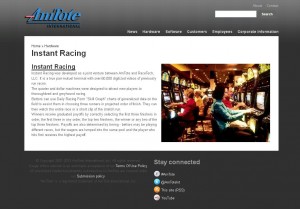Below is a copy of the opinion of Douglas Gansler, the attorney general for the state of Maryland, wherein he explains that he does not believe instant racing machines are legal, due to the fact that they do not use pari-mutuel betting (betting against a pool rather than against the house) and are thus a form of slot machine, which is not allowed at Maryland race tracks. This opinion represents a large development because the legal arm of government has begun not to support these machines.
Form of Government-Sanctioned Gambling
Watch an instant racing machine in action
Many of the gambling interests have argued that instant racing machines are similar to betting on a live horse race and that they should be allowed in states where slot machines are not because they are different than slot machines. Others argue that in practice these machines are little more than slot machines in disguise. Watch for yourself and see what you think: Does this look like a horse race or a slot machine to you?
Proposal to withdraw rules for the installation of instant racing machines
This attached letter is a proposal sent to the executive director of the Texas Racing Commission, Chuck Trout, asking him to withdraw proposals for the installation of instant, or historical, racing machines. The author argues that these machines are no different than slot machines, which are banned in Texas. Also included is the patent for these machines as well as an affidavit regarding an experience with these machines.
How gambling interests describe instant racing machines
Below is a screenshot of how gambling interests describe instant racing machines. Even though anyone can see that these machines are little more than an extension of slot machines, gambling interests continue to describe them as “pari-mutuel betting”.
Memo outlining the case against instant racing machines
Below is a memo that outlines the case against instant racing machines. This is a great read to become more educated on the topic of instant racing machines, how they work, and how the are different from conventional horse-race betting.
Investigation finds Champions League soccer match was fixed
An investigation by Europol, the law-enforcement agency of the European Union, has found that a Champions League soccer match in the UK which ended in a tie was fixed. Europol did not release the identity of the match due to the ongoing investigation, however, they did say the match occurred within the last “three or four years”. Officials say this match-fixing is the work of an organized crime group based in Asia. This article from BBC Sport examines the investigation and its findings.
Match-fixing -Champions League tie played in England was fixed
Casino data can be used to spot and prevent problem gambling….but casinos purposely don’t do it
According to this article from The Wall Street Journal, the same data casinos use to track customers’ gambling habits can be used to identify gambling addicts. Casino customer-tracking information could create computerized models that can spot and warn people with high risk profiles. But what do casino operators, who extract more than half their profits from addicts, think of the idea? “I think it’s a terrible idea,” said former Caesars head Gary Loveman.
Oregon Lottery’s claim about its advertising is false, says Politifact
This article from The Oregonian details the validity of the Oregon Lottery’s claim that they do not show people playing or winning video lottery terminals (VLTs) in their advertising. After combing through all the evidence and reaching out to Lottery officials for clarification, Politifact Oregon has determined that claim to be “false”. This is another example of the Lottery’s questionable advertising practices, and shows that they are often not upfront with their ads.
Politifact: Does the Oregon Lottery show people playing and winning video lottery games
Link found between problem gambling and family violence
A new study by the Problem Gambling Research and Treatment Centre at the University of Melbourne, Australia shows a strong link between problem gambling and familial violence. Fifty-three percent of problem gamblers reported some form of family violence in the past 12 months and Forty-four percent reported victimization in the home. These disturbing numbers show yet another effect of problem gambling, and shows further why more commercialized gambling isn’t a good thing. This HealthCanal study summarizes the study’s findings.
Problem gambling and family violence strongly linked says new study
Casinos drop big money to advertise online gambling
Online gambling was recently legalized in New Jersey. However, if you live in New Jersey, you probably already knew that considering the amount of money casinos recently spent on TV and radio ads, billboards, and Internet ads promoting online gambling and begging consumers to try it. This runs contradictory, however, to the argument casino interests used in getting online gambling legalized- that people are already gambling online anyway so why not legalize it? If people were really gambling online already, then why do casinos need to spend so much to promote it? This Newark Star-Ledger article describes the media blitz.
NJ casinos take over airwaves in online gambling marketing blitz

